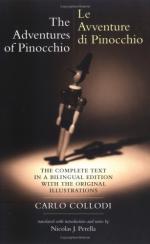“I look quite like a gentleman!”
“Yes, indeed,” answered Geppetto, “for bear in mind that it is not fine clothes that make the gentleman, but rather clean clothes.”
“By the bye,” added the puppet, “to go to school I am still in want—indeed, I am without the best thing, and the most important.”
“And what is it?”
“I have no spelling-book.”
“You are right: but what shall we do to get one?”
“It is quite easy. We have only to go to the bookseller’s and buy it.”
“And the money?”
“I have got none.”
“Neither have I,” added the good old man, very sadly.
And Pinocchio, although he was a very merry boy, became sad also, because poverty, when it is real poverty, is understood by everybody—even by boys.
“Well, patience!” exclaimed Geppetto, all at once rising to his feet, and putting on his old corduroy coat, all patched and darned, he ran out of the house.
He returned shortly, holding in his hand a spelling-book for Pinocchio, but the old coat was gone. The poor man was in his shirt-sleeves and out of doors it was snowing.
“And the coat, papa?”
“I have sold it.”
“Why did you sell it?”
“Because I found it too hot.”
Pinocchio understood this answer in an instant, and unable to restrain the impulse of his good heart he sprang up and, throwing his arms around Geppetto’s neck, he began kissing him again and again.
CHAPTER IX
PINOCCHIO GOES TO SEE A PUPPET-SHOW
As soon as it stopped snowing Pinocchio set out for school with his fine spelling-book under his arm. As he went along he began to imagine a thousand things in his little brain and to build a thousand castles in the air, one more beautiful than the other.
And, talking to himself, he said:
“Today at school I will learn to read at once; then tomorrow I will begin to write, and the day after tomorrow to figure. Then, with my acquirements, I will earn a great deal of money, and with the first money I have in my pocket I will immediately buy for my papa a beautiful new cloth coat. But what am I saying? Cloth, indeed! It shall be all made of gold and silver, and it shall have diamond buttons. That poor man really deserves it, for to buy me books and have me taught he has remained in his shirt-sleeves. And in this cold! It is only fathers who are capable of such sacrifices!”
Whilst he was saying this with great emotion, he thought that he heard music in the distance that sounded like fifes and the beating of a big drum: Fi-fie-fi, fi-fi-fi; zum, zum, zum.
He stopped and listened. The sounds came from the end of a cross street that led to a little village on the seashore.
“What can that music be? What a pity that I have to go to school, or else—”




